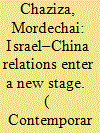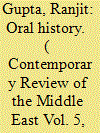|
|
|
Sort Order |
|
|
|
Items / Page
|
|
|
|
|
|
|
| Srl | Item |
| 1 |
ID:
157704


|
|
|
|
|
| Summary/Abstract |
Professor Kumaraswamy is an old friend from the days when I was a visiting professor in the JNU and his request to do the ritual today of unveiling his latest contribution to academic literature could not be side-stepped. My own interest in West Asian studies, somewhat faded, was an added incentive.
|
|
|
|
|
|
|
|
|
|
|
|
|
|
|
|
| 2 |
ID:
157702


|
|
|
|
|
| Summary/Abstract |
Since the establishment of diplomatic ties between China and Israel in 1992, their relations have warmed up and developed rapidly in diverse areas. This study offers a new theoretical framework, strategic hedging behavior, for analyzing Sino-Israel relations, in order to understand the nature and scope of the hedging relationship between China and Israel. What impact will China’s hedging relationship with Israel have on Washington’s dominance in the Middle East region? The study asserts that this relationship is limited to economics and technology, and China’s relations with Israel cannot replace Israel’s strategic and special relationship with the US. However, the future of the hedging relationship countries is highly sensitive to the evolution of US–China relations in the Middle East and other areas.
|
|
|
|
|
|
|
|
|
|
|
|
|
|
|
|
| 3 |
ID:
157701


|
|
|
|
|
| Summary/Abstract |
Lebanese consociationalism has been under stress due to serious internal and external pressures. Though Lebanese regional and global leaders continue to pay lip service to Lebanon’s unity and uphold putative commitments to its sovereignty and territorial integrity, partition to resolve internal crises remains on the table. After a long and still unsettled civil war, absolute internal discord among citizens and, increasingly, the uprisings throughout the region, partition was and is once again openly discussed by many even if most camouflage it under the decentralization, federalism, or con-federalism schemes. The article underlines the inherent vulnerabilities of the Lebanese state and analyzes its deep fault lines raising a serious question about the future integrity of Lebanon.
|
|
|
|
|
|
|
|
|
|
|
|
|
|
|
|
| 4 |
ID:
157703


|
|
|
|
|
| Summary/Abstract |
The Middle East region, especially the oil-rich Arab economies, is regarded as one of Malaysia’s important economic and trading partners. Economic and political changes at the global and regional level have simultaneously shifted Malaysia’s interests in the region. At the same time, there has also been rising interest from countries in the region to expand their economic relationships with Malaysia. Apart from the United Arab Emirates, which is Malaysia’s largest trading partner in the Middle East region, Saudi Arabia and Iran are now becoming more visible for their contributions toward the Malaysian economy. Economic interest certainly is the main driving force behind the latter’s efforts to enhance its connection with these countries. Efforts to reap economic benefit from these countries and to attract petro-dollar investments would also have negative consequences on Malaysia’s domestic, social, and religious affairs due to an influx of Arab and Iranian people coming into the country. Religious extremism and sectarianism are among the challenges that Malaysia is encountering and the authorities are quite critical of those ideologies, and over the years, the teaching of Wahhabism and Shiism have been banned in the country. Could this affect Malaysia’s connection with those countries in the Persian Gulf? How has the government engaged with these local issues without jeopardizing its economic inter-connection with Saudi Arabia and Iran? Given that they are two contrasting countries, how has Malaysia balanced its relationships with these two states?
|
|
|
|
|
|
|
|
|
|
|
|
|
|
|
|
| 5 |
ID:
157705


|
|
|
|
|
| Summary/Abstract |
Shri Hamid Ansari, former Vice President of India, Shri Chenmaya R. Gharekhan, former Prime Minister’s Special Envoy for West Asia, the Deputy Director General of IDSA, my fellow panelist Professor S. D. Muni, the author Professor Kumaraswamy, friends, ladies, and gentlemen.
|
|
|
|
|
|
|
|
|
|
|
|
|
|
|
|
|
|
|
|
|